Headlines
 A team of physicists and education researchers led by CU Boulder and the Rochester Institute of Technology is spearheading the largest study of its kind exploring how the United States can meet the needs of the rapidly growing quantum technology industry.
A team of physicists and education researchers led by CU Boulder and the Rochester Institute of Technology is spearheading the largest study of its kind exploring how the United States can meet the needs of the rapidly growing quantum technology industry.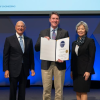 Professor Diddams (Physics; Electrical, Computer and Energy Engineering) was recognized for his outstanding contributions in optical frequency combs and their applications. He joins 128 new U.S. members and 21 international members to the Class of 2025.
Professor Diddams (Physics; Electrical, Computer and Energy Engineering) was recognized for his outstanding contributions in optical frequency combs and their applications. He joins 128 new U.S. members and 21 international members to the Class of 2025.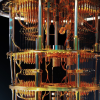 In a new study funded by AB Nexus—an initiative designed to expand collaborations between the CU Anschutz and Boulder campuses—researchers are working with IQM Quantum Computers to identify chemical compounds that might be effective at treating colorectal cancer and inhibiting resistance to chemotherapy.
In a new study funded by AB Nexus—an initiative designed to expand collaborations between the CU Anschutz and Boulder campuses—researchers are working with IQM Quantum Computers to identify chemical compounds that might be effective at treating colorectal cancer and inhibiting resistance to chemotherapy.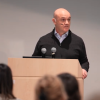 At the annual presentation, Senior Vice Chancellor for Research and Innovation and Dean of the Institutes Massimo Ruzzene highlighted key accomplishments over the past fiscal year, including the launch of the Colorado Quantum Incubator, progress on the National Quantum Nanofab facility, and more.
At the annual presentation, Senior Vice Chancellor for Research and Innovation and Dean of the Institutes Massimo Ruzzene highlighted key accomplishments over the past fiscal year, including the launch of the Colorado Quantum Incubator, progress on the National Quantum Nanofab facility, and more. Like many rockstar scientists, 2025 physics Nobel Laureate John Martinis spent time in Boulder’s rich scientific ecosystem mentoring graduate students and inspiring others in quantum computing. In the 1990s, while working as a scientist at NIST, Martinis also held the position of a physics lecturer at CU Boulder.
Like many rockstar scientists, 2025 physics Nobel Laureate John Martinis spent time in Boulder’s rich scientific ecosystem mentoring graduate students and inspiring others in quantum computing. In the 1990s, while working as a scientist at NIST, Martinis also held the position of a physics lecturer at CU Boulder.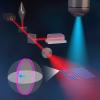 Jun Ye's research group has developed a groundbreaking laser system capable of manipulating quantum states with unprecedented precision. Their system significantly reduces frequency noise, a major hurdle in quantum experiments, offering record-breaking stability that is crucial for advancing quantum technologies.
Jun Ye's research group has developed a groundbreaking laser system capable of manipulating quantum states with unprecedented precision. Their system significantly reduces frequency noise, a major hurdle in quantum experiments, offering record-breaking stability that is crucial for advancing quantum technologies. Svenja Knappe (Mechanical Engineering) is collaborating with scientists from the CU Anschutz Medical Campus to advance the use of quantum sensors that could aid in more effective diagnosis and treatment of a wide range of brain disorders.
Svenja Knappe (Mechanical Engineering) is collaborating with scientists from the CU Anschutz Medical Campus to advance the use of quantum sensors that could aid in more effective diagnosis and treatment of a wide range of brain disorders. Award-winning physicist Matt Eichenfield has been named the inaugural Karl Gustafson Endowed Chair of Quantum Engineering in the Department of Electrical, Computer and Energy Engineering at CU Boulder.
Award-winning physicist Matt Eichenfield has been named the inaugural Karl Gustafson Endowed Chair of Quantum Engineering in the Department of Electrical, Computer and Energy Engineering at CU Boulder.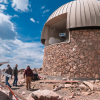 An NSF-funded collaboration between CU Boulder, NIST, and NOAA has set up a mobile optical atomic clock at the top of Mount Blue Sky in Colorado to capture what might be the most precise measurement yet of how time moves faster the farther you get from the center of Earth.
An NSF-funded collaboration between CU Boulder, NIST, and NOAA has set up a mobile optical atomic clock at the top of Mount Blue Sky in Colorado to capture what might be the most precise measurement yet of how time moves faster the farther you get from the center of Earth. Atom Computing, which focuses on developing large-scale quantum computers that can achieve unprecedented computational breakthroughs, will use space at COQI while expanding and renovating its existing Boulder facility.
Atom Computing, which focuses on developing large-scale quantum computers that can achieve unprecedented computational breakthroughs, will use space at COQI while expanding and renovating its existing Boulder facility.

